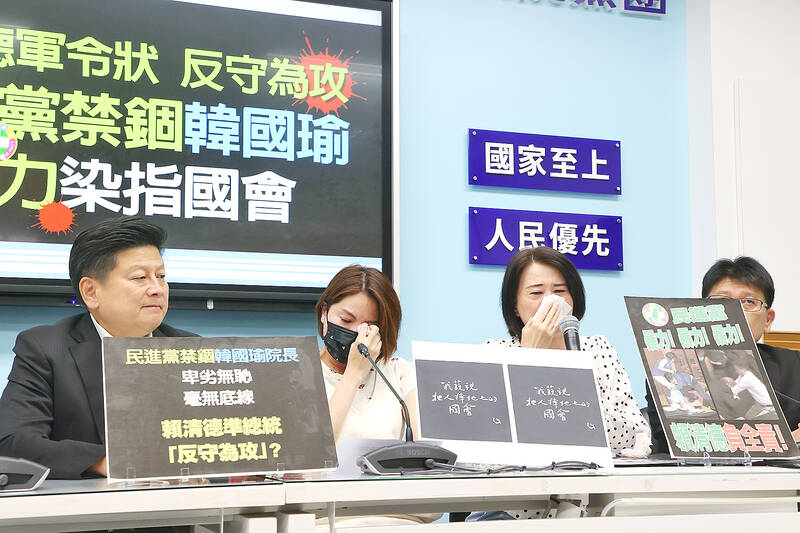The Democratic Progressive Party (DPP) should take all 52 Chinese Nationalist Party (KMT) lawmakers to court if they have the guts, KMT caucus Whip Fu Kun-chi said yesterday in response to the DPP’s saying that it would pursue legal actions over what it called the KMT’s “atrocities” on Friday.
Massive brawls broke out on Friday and continued throughout the day in the main chamber of the Legislative Yuan as DPP legislators tried to prevent the passing of legislative reform bills.
The Taiwanese public saw the “darkest day” in the history of the nation’s parliament, Fu said yesterday.

Photo: CNA
Aside from the physical altercations, Legislative Speaker Han Kuo-yu (韓國瑜) was a “forced captive” in the resting chambers as a result of the DPP’s “thuggish” behavior, Fu said, adding that the DPP at the time also threatened to only let Han leave if he would announce recesses and not allow legislative proceedings for items on Friday’s agenda.
It is unfortunate that president-elect William Lai (賴清德) failed to criticize the violent acts of his own party’s legislators, Fu added, citing nine major incidents of violence that he said DPP legislators had committed against KMT legislators. The DPP had also broken public facilities, assaulted the 72-year-old Legislative Yuan Secretary-General Chester Chou (周萬來) and threatened legislatorial staff, he said.
KMT Legislator Wu Tsung-hsien (吳宗憲) was attacked and had a bruised ribcage, KMT Legislator Wang Hung-wei (王鴻薇) had a bruised hand and female KMT Legislator Chen Ching-hui (陳菁徽) was tackled by male DPP Legislator Chung Chia-pin (鍾佳濱) and also sustained bruises, Fu said.
Chen said she was unable to stop Chung from clambering up onto the speaker’s podium on Friday and that Chung tackling her could be considered an act of violence, harassment or even an intent to commit murder.
Chen urged DPP legislators to support her in criticizing Chung’s actions and ensuring gender equality in the legislature.
KMT Chairman Eric Chu (朱立倫) yesterday criticized the DPP’s violence, stating that he believed the public could not accept the DPP’s blatant attack on police officers and legislators who were doing their jobs.
Chu urged Lai not to succumb to arrogance and indulge his party’s lawmakers in creating a scene when the party is in power, adding that he hoped that Taiwan would have a democratic and progressive society and not a community rife with violence from “so-called democratic supporters.”
Additional reporting by Huang Shu-li

‘DENIAL DEFENSE’: The US would increase its military presence with uncrewed ships, and submarines, while boosting defense in the Indo-Pacific, a Pete Hegseth memo said The US is reorienting its military strategy to focus primarily on deterring a potential Chinese invasion of Taiwan, a memo signed by US Secretary of Defense Pete Hegseth showed. The memo also called on Taiwan to increase its defense spending. The document, known as the “Interim National Defense Strategic Guidance,” was distributed this month and detailed the national defense plans of US President Donald Trump’s administration, an article in the Washington Post said on Saturday. It outlines how the US can prepare for a potential war with China and defend itself from threats in the “near abroad,” including Greenland and the Panama

A wild live dugong was found in Taiwan for the first time in 88 years, after it was accidentally caught by a fisher’s net on Tuesday in Yilan County’s Fenniaolin (粉鳥林). This is the first sighting of the species in Taiwan since 1937, having already been considered “extinct” in the country and considered as “vulnerable” by the International Union for Conservation of Nature. A fisher surnamed Chen (陳) went to Fenniaolin to collect the fish in his netting, but instead caught a 3m long, 500kg dugong. The fisher released the animal back into the wild, not realizing it was an endangered species at

The Chinese Nationalist Party (KMT) is maintaining close ties with Beijing, the Democratic Progressive Party (DPP) said yesterday, hours after a new round of Chinese military drills in the Taiwan Strait began. Political parties in a democracy have a responsibility to be loyal to the nation and defend its sovereignty, DPP spokesman Justin Wu (吳崢) told a news conference in Taipei. His comments came hours after Beijing announced via Chinese state media that the Chinese People’s Liberation Army’s Eastern Theater Command was holding large-scale drills simulating a multi-pronged attack on Taiwan. Contrary to the KMT’s claims that it is staunchly anti-communist, KMT Deputy

The High Prosecutors’ Office yesterday withdrew an appeal against the acquittal of a former bank manager 22 years after his death, marking Taiwan’s first instance of prosecutors rendering posthumous justice to a wrongfully convicted defendant. Chu Ching-en (諸慶恩) — formerly a manager at the Taipei branch of BNP Paribas — was in 1999 accused by Weng Mao-chung (翁茂鍾), then-president of Chia Her Industrial Co, of forging a request for a fixed deposit of US$10 million by I-Hwa Industrial Co, a subsidiary of Chia Her, which was used as collateral. Chu was ruled not guilty in the first trial, but was found guilty